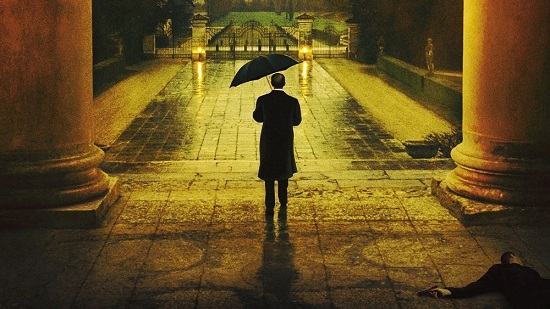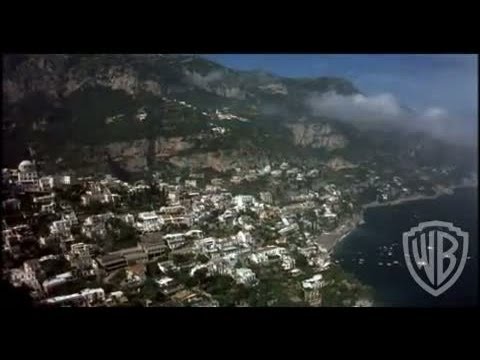Welcome to Injustice For All, a semi-regular feature here on The Quietus in which we ask our writers to nominate their choice of underrated film and to argue its case. For this debut installment Tony McKiver takes up arms in defence of Liliana Cavani’s Ripley’s Game
"The world is not a poorer place because those people are dead. It’s not. It’s one less car on the road. It’s a little less noise and menace."
As tempting as Patricia Highsmith’s Ripley books have proven for filmmakers over the decades, those who have yielded to the urge of adaptation have struggled, sometimes creditably, to bring her most famous creation vividly to the screen. At the core of the challenge is the character of Tom Ripley himself, who Highsmith offers as a wish-fulfilment anti-hero murderously negotiating the borders between classes, between the possessions and self-possession of those born into wealth and, well, the rest of us "oiks." In some respects, Ripley is a model for Hannibal Lecter, manifesting cultivated taste and a murderous appetite. Whereas Thomas Harris’s more lurid creation lives in a cod-Gothic world of camp supervillainy (Lecter falls squarely on the Blofeld spectrum with his six fingers and maroon irises), Ripley is hampered by the mean conditions of everyday life, always showing concern for how the bills are paid, sweating over the stray details that get men imprisoned or executed. Any of the readerly pleasures of murder-by-proxy are counterbalanced by the squirming discomfort of identifying with Ripley as he toils to cover up his crimes. Highsmith’s character operates in a register of black comedy, dealing lethally with the bad neighbours and noisy philistines we have to put up with. Highsmith takes the moral handbrake off the character to play out our whimsical murderous daydreams. Unfortunately, the evidence of cinematic adaptation suggests that is not a pitch that transfers faithfully from page to screen.
Wim Wenders’s The American Friend has its fans, but Dennis Hopper’s Tom Ripley is almost entirely unavailable to us, and is certainly psychologically inaccessible to the viewer, and, consequently, the greatest pleasure of Highsmith’s work is completely absent. Anthony Minghella’s The Talented Mr Ripley presents us with almost the opposite problem. We sweat and fret inside the skin of Matt Damon’s self-conscious Ripley as he struggles to pack his lumpy, arriviste inadequacies into a blueblood’s trim blazer, but there is no trace of the assurance and élan of Highsmith’s character. If you’re down for a film that glances off the surface of Highsmith’s source, then dig Wenders’s take, with its self-regarding, heavily advertised adoration of his outlaw auteurs in cameos by Sam Fuller, Nicholas Ray or Dennis Hopper. If you enjoy opulent production design and the dull heavy binding of Oscar bait on the Riviera, then the Minghella film it is with all its polished Miramax factor. Elsewhere there is Plein Soleil, Rene Clement’s earlier adaptation of TTMR, and a more recent adaptation of Ripley Under Ground that seems to be almost as obscure and unseen as it is unloved by the few who have found it.
It stars Battlefield Earth‘s Barry Pepper.
It is not an entirely bleak landscape of failure, however. Anyone with a yen for the fun that Highsmith mines from Ripley’s giddy sociopathy should really seek out Liliana Cavani’s Ripley’s Game.
In the role of Tom Ripley, John Malkovich’s immovable square-peg mannerisms find their neatest fit. The actor’s Europhilia and high-brow bearing are tailor made for the part. These loftier traits coexist with a pragmatic get-on-with-it sensibility that – in the character – sees him quite willing to get involved in an act of serial garrotting, while the actor shows a similar willingness to muck in happily in films that would seem to go against the grain of "serious" work, such as the chief goon in the wonderful Con Air or the loopy sidekick in Red. Like Tom Ripley, Malkovich convincingly spans the gulf between fine manners and spontaneous violence. When Ripley threatens one unlucky gangster that he will run his "fucking tractor over his head the rest of the day" we don’t doubt either his willingness or ability to do so. With little effort, we even can let our minds conjure the image of Malkovich himself behind the wheel of a John Deere, maybe as a pleasant distraction in between memorising his lines for Raúl Ruiz’s Proust adaptation Time Regained or reviewing his investments with Bernie Madoff.
Kudos to casting for perfectly matching Malkovich’s pernickety Ripley with Ray Winstone’s thug-with-airs Reeves in a chalk-and-cheese clash of background and manners. The effort Ripley puts into the aesthetics of his life and the perfecting of his home is perfectly balanced by the lengths Reeves goes to soil it all, deliberately knifing some of his greasy fried egg onto Ripley’s beautiful chaise longue. Reeves is a half-smart oaf whose art-world dealings with Ripley have lifted him into wealth, but not beyond the grasp of his Russian gangster rivals. When Reeves arrives at Ripley’s Tuscan villa seeking help in dealing with his foes, Ripley is dismissive until a terminally ill expat-Brit neighbour, Jonathan Trevanny (Dougray Scott), displays some bad manners and gets on his wrong side. Ripley overhears Trevanny insult the restorations he has carried out on his villa and takes such offence that he inveigles Trevanny into becoming the unlikely assassin who takes out Reeves’s competition. Ripley is mannerly enough to know that he has gone too far in recruiting this civilian (a man aware of his own "positively shocking awful normalness") and ends up lending a hand when Trevanny is required to get rid of trios of thugs. Repeatedly we see the mannerly, considerate Ripley – offering advice on where to get the best cuts of meat, purchasing peonies for his partner, and simply taking his leave of Trevanny with a cheerful "Be well."
Prior to Ripley’s Game, I’d always thought that the archetypal Malkovich role was that of Mitch Leary, the would-be presidential assassin playing cat and mouse with Clint Eastwood’s Sadolin Secret Service agent Frank Horrigan in Wolfgang Petersen’s thrilling In The Line Of Fire. Where Horrigan/Eastwood is all manly stoicism, wounded by his failure years earlier to protect Kennedy in Dallas, Leary is self-assured, opinionated, and clearly well-read. Throughout the film, Leary calls Horrigan, who is reluctantly forced to draw out the conversations as the agency tries to trace Leary’s location, all the while Horrigan has to put up with Leary’s talk. The clash of tone and style is so real that Horrigan’s gritted-teeth appeal – receiver covered – "How much more of this crap do I have to put up with?" – feels like an ad lib by Eastwood. A law of contrasts means that Eastwood is a hero because he is unpretentious, instinctual and modest, while Malkovich’s villainy lies in the fact that he is verbose, calculated and pretentious. Even so, Malkovich was really just the second banana in this film, the whipping boy whose enjoyable nagging egg-headedness must be punished extravagantly onscreen. Ripley’s Game throws the spotlight on the kind of character more often deployed as a villain, or underused in a strong cameo part, such as Malkovich’s nasally congested internal affairs cop in the otherwise forgettable Jennifer 8.
At one point we see Ripley stitching in bed – we can’t tell whether it’s penny-sparing repair work or hobbyist embroidery. Later we see him baking a soufflé, his disappointment at its collapse registering more strongly than any emotion at the murders he commits throughout the film. A patron of the arts, he commissions the restoration of a harpsichord that his partner will play in a concert at the end of the film. When told by the restorers that it will take months to accomplish, he offhandedly replies that they have two weeks. His criminality feeds a life steeped in the joys of simply appreciating art and beauty, making him unexpectedly a brother to Michael Caine’s scam artist Lawrence Jamieson in Dirty Rotten Scoundrels, whose ill-gotten gains go towards similar ends and who speaks for both of them when he says, "I finally came to the frustrating conclusion that I had taste and style, but no talent."
Malkovich’s Ripley is as awkwardly moral as he is mannerly. When his art-dealing partnership with Reeves culminates in murder, Ripley walks away from the deal, giving all the money to Reeves. Though he doesn’t believe he is being watched or judged for his crimes, he makes an effort to help Trevanny out of the trouble he has landed the picture-framer in. Never expecting others to do the right thing, he is surprised when Trevanny shows up at his villa to help fight off vengeful Russian goons. Finally, Ripley is astonished by Trevanny’s climactic sacrifice of taking a bullet for him. We see this action twice – the first time, as it occurs. The second time, we see Ripley caught in reflection and we witness Trevanny’s death from Ripley’s perspective. Why is this action haunting not only for Ripley but for viewers? There are many amusing surprises in the film, the greatest of which is perhaps our surprise at Ripley’s surprise at being surprised.
There isn’t a chance that any Ripley movie would get made today. The blend of cheerful murdering and unexpected morality would stymy Cavani’s film, which – even in the more variegated exhibiting climate of 2002 – didn’t get a cinema release in the United States. Somewhere, however, I’m sure that someone is tailoring their pitch for a Ripley TV series to HBO, Amazon, or, most likely, Netflix, perhaps leaning on the notion of treating each book as a season, and pointing excitedly to the example of the Hannibal TV series. Yes, this will happen. What kind of Ripley will we see? It is not likely to be the embroidering, peony-ordering, soufflé-baking, softly-spoken, sociopath threatening to drive his tractor over someone’s skull. It will not be Highsmith’s Ripley. It will not be Cavani’s Ripley. It will not be Malkovich.
@TonyMcKiver



